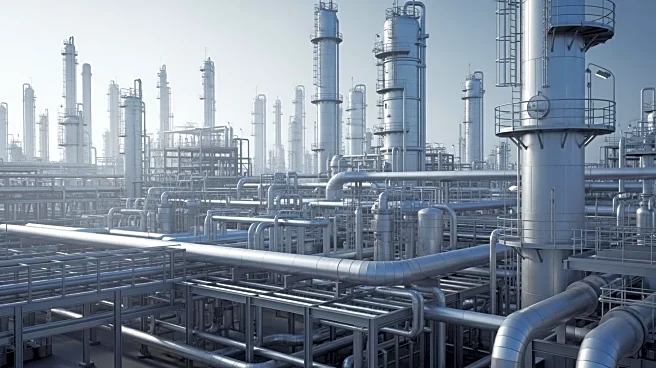What's Happening?
Iraq is on the verge of achieving self-sufficiency in gasoline production, as announced by Oil Minister Hayan Abdul Ghani. The country is expanding its oil refining capabilities at the North Refineries
complex in Baiji, which is central to Iraq's strategy to reduce dependency on imported fuel. The reconstruction and expansion efforts aim to restore production capacity to 600,000 barrels per day, with modern units designed to produce high-octane gasoline. The North Refineries Project, previously damaged during the ISIS occupation, has been rehabilitated, now operating with a refining capacity of 380,000 barrels per day. A significant component of this initiative is the $3.75 billion Fluid Catalytic Cracking (FCC) project, funded by a Japanese loan, which will produce high-octane gasoline, diesel, and LPG from heavy fuel oil.
Why It's Important?
This development is crucial for Iraq's energy independence, as it significantly reduces the need for imported petroleum products. Previously, Iraq spent up to $5 billion annually on imports, a figure that has already decreased to less than a quarter. With the completion of the FCC project, Iraq aims to cease imports of white products entirely. This move not only strengthens Iraq's economic position but also enhances its ability to export surplus fuel, potentially boosting its economy further. The project reflects Iraq's broader efforts to rebuild and modernize its energy infrastructure post-ISIS occupation, contributing to national stability and growth.
What's Next?
The completion of the FCC project is expected to eliminate Iraq's need for imported gasoline, allowing the country to focus on exporting surplus fuel. The recent inauguration of additional refining units, such as the fourth unit at the South Refineries and the Azmerah unit, along with the opening of the fats refinery in Baiji, positions Iraq to meet domestic demand and explore international markets. These developments may lead to increased economic activity and investment opportunities in Iraq's energy sector, potentially attracting foreign partnerships and enhancing regional energy dynamics.
Beyond the Headlines
The rehabilitation and expansion of Iraq's refining capabilities highlight the country's resilience and commitment to overcoming past challenges, such as the destruction caused by ISIS. This project not only addresses immediate economic needs but also sets a precedent for future infrastructure development in Iraq. The focus on energy independence may inspire similar initiatives in other sectors, fostering a culture of self-reliance and innovation. Additionally, the environmental implications of modernizing refineries to produce cleaner fuels could contribute to regional efforts to address climate change.









